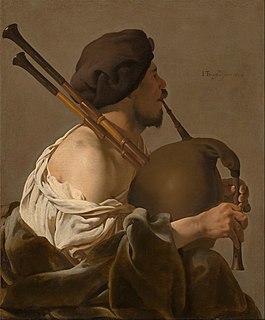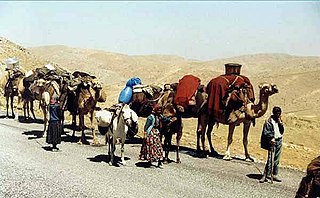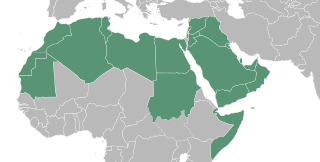
Bagpipes are a woodwind instrument using enclosed reeds fed from a constant reservoir of air in the form of a bag. The Scottish Great Highland bagpipes are the best known in the Anglophone world; however, bagpipes have been played for a millennium or more throughout large parts of Europe, northern Africa, and western Asia, including Turkey, the Caucasus, and around the Persian Gulf. The term bagpipe is equally correct in the singular or plural, though pipers usually refer to the bagpipes as "the pipes", "a set of pipes" or "a stand of pipes".
Turkmen is the official language of Turkmenistan and the language of the Turkmen peoples of Central Asia. It is a Turkic language spoken by 3.5 million people in Turkmenistan as well as by around 719,000 people in northeastern Iran and 1.5 million people in northwestern Afghanistan. Not all "Turkmen" in northeastern Iran are speakers of Turkmen; many are speakers of Khorasani Turkic.
Turkmen, Türkmen, Turkoman or Turkman may refer to:

Turkmens are a nation and Turkic ethnic group native to Central Asia, primarily the Turkmen nation state of Turkmenistan. Smaller communities are also found in Iran, Afghanistan and North Caucasus. They speak the Turkmen language, which is classified as a part of the Eastern Oghuz branch of the Turkic languages. Examples of other Oghuz languages are Turkish, Azerbaijani, Qashqai, Gagauz, Khorasani, and Salar.

The Iraqi Turkmen Front is a political movement founded in 1995 which seeks to represent the Iraqi Turkmen people. Since the fall of Saddam Hussein in 2003, the ITF has contested control of Kirkuk and other areas of northern Iraq. The ITF claims that Kirkuk belongs to the Turkmen people although they compose only 13–17 percent of the population.

The Yörüks, also Yuruks or Yorouks, are a Turkish ethnic subgroup, some of whom are nomadic, primarily inhabiting the mountains of Anatolia, and partly in the Balkan peninsula. Their name derives from the Turkish verb yürü-, which means "to walk", with the word yörük or yürük designating "those who walk on the hindlegs, walkers". Yörüks lived within the Yörük Sanjak which was not a territorial unit like other sanjaks but a separate organisational unit of the Ottoman Empire.
Minorities in Iraq include various ethnic and religious groups.
The Ramadanids, also known as the Ramadanid dynasty, Emirate of Ramadan, Beylik of Adana, and Ramadanid principality, was one of the Anatolian beyliks. Its capital was in Adana. It was one of the frontier emirates established by Oghuz Turkish clans after the decline of Seljuk Sultanate of Rum.

The Iraqi Turkmen, also referred to as Iraqi Turks, or Turks of Iraq, are Iraqi citizens of Turkic origin who mostly adhere to a Turkish heritage and identity. Most Iraqi Turkmen are the descendants of the Ottoman soldiers, traders and civil servants who were brought into Iraq from Anatolia during the rule of the Ottoman Empire. Despite the popular reference to the Turks of Iraq as "Turkmen", they are not directly related to the Turkmen people of Turkmenistan and do not identify as such.

Jarabulus is a Syrian city administratively belonging to Aleppo Governorate. Jarabulus, also known as Jerablus, lies on the western bank of the river Euphrates. In the 2004 census, the city had a population of 11,570. The population has increased significantly during the Syrian civil war. It is considered to be the de facto capital of the opposition-controlled Northwestern part of Syria.

Syrian Turkmen, are Syrian citizens of mainly Turkish origin whose families had migrated to Syria from Anatolia during the centuries of Ottoman rule (1516–1918).

Turkmeneli, also known as Turkmenland, and historically as Turcomania, is a political term used by the Iraqi Turkmen/Turkoman minority in Iraq to define the vast swath of territory in which they have historically had a dominant population. The term incorporates the Iraqi Turkmen/Turkoman homelands running from Iraq's border with Turkey and Syria and diagonally down the country to the border with Iran.
The Turks in Israel, also referred to as Israeli Turkmen are ethnic Turkish descendants who have had a long-established presence in the region. Migration of Turkish settlers began in the 12th century, and continued throughout the Mamluk and Ottoman rule. During the British mandate of Palestine, the Turkmen lived mostly in the Jezreel Valley region; and, up until the Israeli conquest in 1967, Turkmen tribes lived in the Golan Heights.

A gul is a medallion-like design element typical of traditional hand-woven carpets from Central and West Asia. In Turkmen weavings they are often repeated to form the pattern in the main field.

The Turks in the Arab world refers to ethnic Turkish people who live in the Arab World. There are significant Turkish populations scattered throughout North Africa, the Levant, and the Arabian Peninsula.

Tarsus Grand Mosque is a mosque in Tarsus, Mersin Province, Turkey.
International Turkmen-Turkish University was a university located in Ashgabat, Turkmenistan. The University was established in 1994.

Turkmen Mountain is a mountain range in the north of Latakia region of Syria, in the area called Bayırbucak locally in Turkish, neighboring the Turkish border. The mountain range runs along the eastern length of Latakia Governorate. The area is mostly inhabited by Syrian Turkmen people and has seen military activity by the Syrian Army and Russian air strikes in late 2015. Close to 300,000 Turkmens have been displaced since the start of the Syrian civil war, especially in The Turkmens mountains, where the Government enacted a demographic change by forcing the last remaining Turkmen Families to leave to Turkey, and settled Alawite families in the areas controlled by government forces.

Abdurrahman Mustafa is the incumbent president of the Syrian Turkmen Assembly, the umbrella organization of the Turkmen political movements in Syria, and the political leader of the Turkmen national movement of Syria. On 6 May 2018, he was elected as the head of the Syrian National Coalition.














